The rumor mill tells me that there’s a big election right around the corner, and just like the games on this top six list it’s sure to be filled with excitement, uncertainty, and just a bit of nervousness. No matter where you fall on the political spectrum, we can all agree that voting is an important part of the democratic process, and a civic duty. So make sure you get out there and vote… and after you’re done you can cast your ballot for fun.
Mafia

Back in 1987, a Russian psychologist by the name of Dimitry Davidoff created a party game with a simple premise: can an uninformed majority defeat an informed minority? The tool they have to do this is simple: vote out those you suspect of being part of the minority. Thus, “Mafia” was born. Over the next several decades, the game would grow and evolve. People would reflavor it as “Werewolf” and add in roles that have special powers, like the ability to check someone’s alignment, or protect someone from elimination. Since the golden age of board games began, plenty of designers have tried their hand at implementing this game in new ways. Even some of the other entries on this list owe their DNA to Davidoff’s creation. Whether it’s One Night Ultimate Werewolf, Two Rooms and a Boom, Shadow Hunters, or Mafia de Cuba, it’s safe to say that Mafia’s influence on modern gaming has created an entire subgenre dedicated to social deduction.
City of Horror
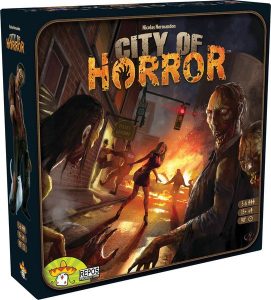
Halloween is almost upon us and City of Horror is a great game to pull out for this season. Each player is in control of a number of characters who are worth varying numbers of points. Players must keep their characters alive to score their points and have a medical vial resource for each character they want to keep that way at the end of four rounds. As players send their characters scrambling among the buildings in the game, they will inevitably find their locations overrun by zombies. Whenever a building is attacked by zombies each player who has one or more characters present must decide to collectively fight (which sucks up limited resources, and isn’t always an option) or vote to throw one character to the zombies to buy time until the next round.
Players can beg, plead, make promises of future actions (which don’t have to be kept), trade weapon cards or other items, and team up against each other before the vote is cast. Pretty much anything in the game is negotiable. When the dust settles players must also then vote who gets awarded items that are dropped in each location, including those aforementioned medical vials necessary to win! And once again anything is negotiable. The voting creates an urgency, desperation, and clever social dynamism as players fight to keep their characters alive and throw others to the zombies. This in turn creates some very cinematic, even explosive, moments in a game that is one of the most thematic and criminally overlooked zombie survival games on the market.
Zoocracy

A game about a pseudo United Nations composed solely of animals? You have my attention. In Zoocracy players trust their animal instincts and lead their party through an interactive political strategy game. Every round players vote in a parliamentary election campaign, spending food to accomplish their political goals. Players will need to form coalitions with their opponents, working towards similar goals, while doing their best to maintain enough distance between themselves to break ranks and achieve their own personal political agendas. Chewy gameplay and killer artwork combine to make a game that poli-sci majors will love; and fans of political and negotiation style games will definitely enjoy.
Read our review of Zoocracy.
The Resistance
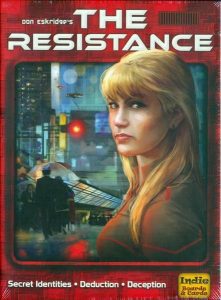
The Resistance — as well as its Arthurian alternative, Avalon — follows in the trailblazing footsteps of Mafia. Like that title, The Resistance also features a small group of knowledgeable ne’er-do-wells pitted against a larger group of gullible good-doers. What The Resistance adds, though, makes this one worth picking up. For starters, it doesn’t require a moderator of any kind and features no player elimination, letting everyone get into the action and stay in the action over the entire course of the game.
To make things even juicier, it introduces a best-of-5 mission system: each round, a set number of players are nominated by a single player and confirmed through a group vote to participate in the mission. These players will secretly either Support or Sabotage the mission. Players on the Resistance team (good) must always Support, while the Imperial Spies (bad) are free to do either as they see fit. This delicious twist leads to endless second-guessing, finger-pointing, and heated accusations as the good team tries to root out the traitors. Votes can get extremely tense, especially when it comes down to the last mission for either side. While both The Resistance and Avalon offer extra oomph by including Plot cards and optional roles, respectively, the base games come packed with enough politicking and secret information to fill your gaming ballot.
Article 27
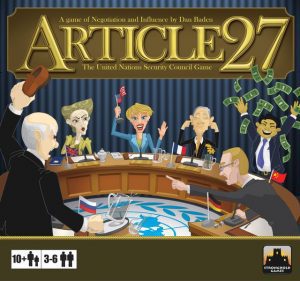
“Article 27” refers to the portion of the United Nations Charter which confers veto power onto the permanent members of the Security Council. In the game of Article 27, three to six players take on the roles of the different member nations as they wheel and deal to push through their secret agendas and gather the most influence.
Up for debate are five primary concerns: peacekeeping, trade sanctions, diplomatic sanctions, humanitarian concerns, and nuclear non-proliferation. Each round of the game will see the players receive five secret Issue tokens which will earn and/or cost them a number of points, based on how the players secretly arrange them behind their screen, depending on how the final vote shakes out. One person takes on the role of Secretary General and they will choose any number of the five concerns to place into the middle of the board as a proposal. Then the 5-minute timer is activated and the negotiating begins… and virtually anything can be negotiated. For instance, the players can bribe each other to vote certain ways or bribe the Secretary General to add or remove items from the proposal. When the timer ends, the negotiations are over and the players will secretly cast a vote whether or not to pass the final proposal; a vote which will definitely not please everyone, especially if it’s a veto. If any player vetoes, the proposal will fail regardless of whether or not the vote received a positive majority.
Alliances will be formed and backs will be stabbed. This is the way of Article 27. Once each player has had their requisite number of turns as the Secretary General, the final influence points are awarded and the player with the most wins the game. Article 27 is a game rife with corruption and sneaky underhandedness. But when the game’s over, you’ll definitely all agree that it was a lot of fun.
Dixit
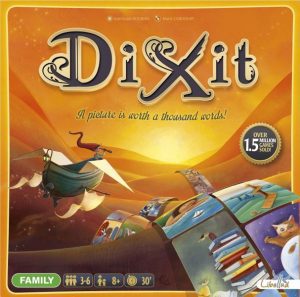
This 2010 Spiel des Jahres winner is deceptively simple. One player begins by choosing a card in their hand from a selection of cards illustrated with abstract, dream-like imagery. That player, the storyteller, makes up a sentence to describe the card and says it out loud. Every other player picks a card from their hand that best aligns with the sentence. All selected cards are shuffled and revealed, and then each player has to vote for which card they think is the correct one.
But here’s the trick: if all or zero players correctly find the storyteller’s card, the storyteller scores no points. As such, the storyteller wants to get some people to find the correct card, but not everybody! This creates an incentive to be vague and obtuse, which makes voting correctly even harder. Actually, a vague idea being too muddy and confusing, therefore making voting correctly difficult is about the best real-world-to-mechanics translation we could think of in 2020.


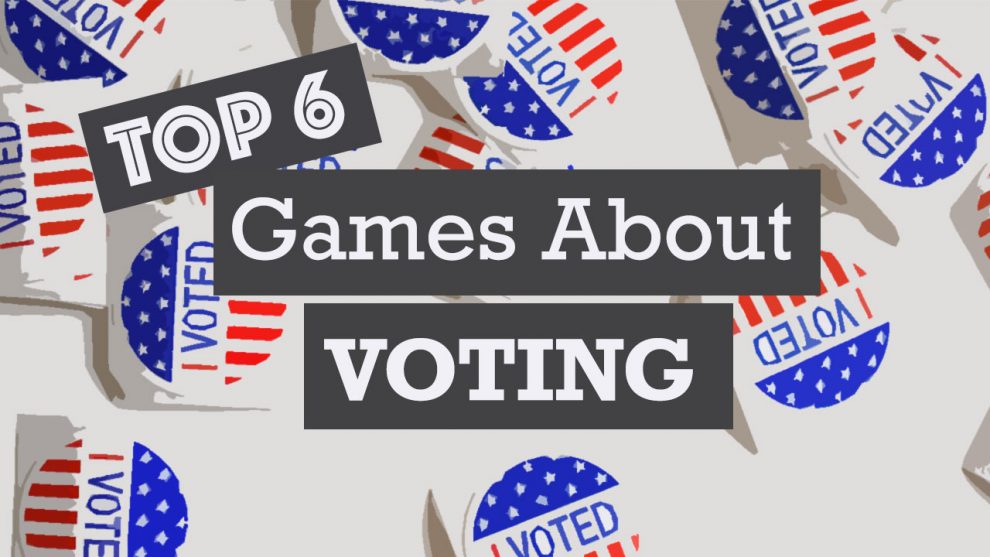








Add Comment